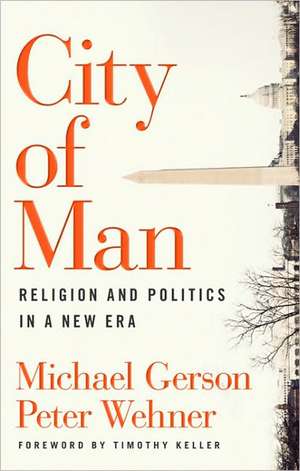City of Man: Religion and Politics in a New Era
Autor Michael Gerson, Peter Wehner Timothy J. Kelleren Limba Engleză Hardback – 30 sep 2010
An era has ended. The political movement that most galvanized evangelicals for more than a quarter-century, the Religious Right, is fading away. What lies ahead is unclear.
Into this uncertainty, former White House insiders Michael Gerson and Peter Wehner call evangelicals toward a new kind of political engagement -- a kind that is better both for the church and the country, a kind that cannot be co-opted by either political party, a kind that avoids the historic mistakes of both the Religious Right and the Religious Left.
A product of the authors' own wrestling with the complicated relationship between religion and politics, City of Man assesses the past, surveys the present, and deals with questions central to evangelicals' future political role, including:
* How can religious people exercise influence while maintaining their integrity?
* What tone should they be known for?
* How should they think about the role and purpose of government?
* Which causes and issues, both at home and abroad, ought to be a part of their agenda?
Incisive, bold, and marked equally by pragmatism and idealism, Gerson and Wehner's book charts a new political future not just for civic-minded Christians and "values voters," but for the nation as a whole.
Preț: 120.19 lei
Nou
23.01€ • 24.100$ • 19.34£
Carte indisponibilă temporar
Specificații
ISBN-10: 0802458572
Pagini: 140
Dimensiuni: 139 x 211 x 18 mm
Greutate: 0.32 kg
Editura: Moody Publishers
Descriere
Into this uncertainty, former White House insiders Michael Gerson and Peter Wehner call evangelicals toward a new kind of political engagement -- a kind that is better both for the church and the country, a kind that cannot be co-opted by either political party, a kind that avoids the historic mistakes of both the Religious Right and the Religious Left.
A product of the authors' own wrestling with the complicated relationship between religion and politics, City of Man assesses the past, surveys the present, and deals with questions central to evangelicals' future political role, including:
* How can religious people exercise influence while maintaining their integrity?
* What tone should they be known for?
* How should they think about the role and purpose of government?
* Which causes and issues, both at home and abroad, ought to be a part of their agenda?
Incisive, bold, and marked equally by pragmatism and idealism, Gerson and Wehner's book charts a new political future not just for civic-minded Christians and "values voters," but for the nation as a whole.
